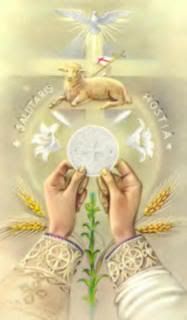
Zachary's wife Elizabeth was beyong childbearing age, and John's birth was foretold by the angel Gabriel to the priest Zachary, John's father, who was temporarily struck dumb for his disbelief, receiving the power of speech again only at John's circumcision.

When Mary visited and greeted Elizabeth, who was in her sixth month, Our Lord, in Mary's womb, implemented Sanctifying grace to John, whose mission in God's plan was to be the forerunner of Christ. And he whose joy it was to prepare the way for the Lamb of God and who rejoiced "because of the Bridegroom's voice" (John 3:29)did recognize the presence of Jesus and Mary before he was even born, and this moved him to leap for joy in his mother's womb.

St John the Baptist lived in the desert for some thirty years before he began his public ministry.

He went into the country around Jordan preaching to "do penance for the kingdom of heaven was at hand," (Matthew 3:2)

His clothes were made of camel's hair, and a leather girdle about his loins, and he came neither eating or drinking. (Matthew 11:18)

John baptized his listeners in the Jordan, challenging their pride by calling them all a "brood of vipers," (Luke 3:7-9) and earning himself his name, "The Baptist."

After some time of John's preaching, Jesus came to be baptized by him, and John gave testimony that Jesus was the Son of God, but at first John refused to baptize Jesus, saying "I ought to be baptized by thee, and comest thou to me?" (Matthew 3:14).

When Herod fell in love with his niece Herodias, the wife of his half-brother Philip, and brought her to Galilee, John publicly rebuked Herod, and at Herodias' bidding, was bound and thrown in prison. "She laid snares for him: and was desirous to put him to death" (Mark 6:19).

John the baptist was the undaunted champion of truth and virtue, and Herodias was furious with him, swaying Herod to put John to death. The daughter of Herodias, named Salome, danced before Herod, and pleased him such that he said he would grant her anything she wished for.

Under the influence of her mother, Salome was swayed. "Who when she had gone out, said to her mother, What shall I ask? But her mother said: The head of John the Baptist. 25 And when she had come in immediately with haste to the king, she asked, saying: I will that forthwith you give me in a dish, the head of John the Baptist. 26 And the king was struck sad. Yet because of his oath, and because of them that were with him at table, he would not displease her: 27 But sending an executioner, he commanded that his head should be brought in a dish." (Mark 6:24-28)

The Church celebrates the feast day of the beheading of John the Baptist on August 29.













2 comments:
Fr. Corapi's birthday too. Nice post, well researched for the art to accompany St. John's life.
Thanks, Shirley. It takes a couple of hours to do a post like this.
Post a Comment